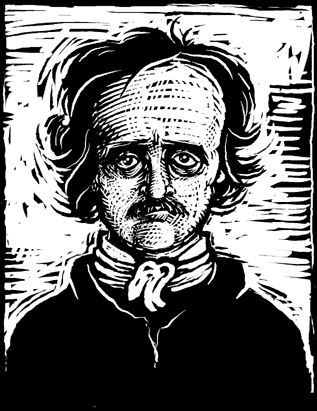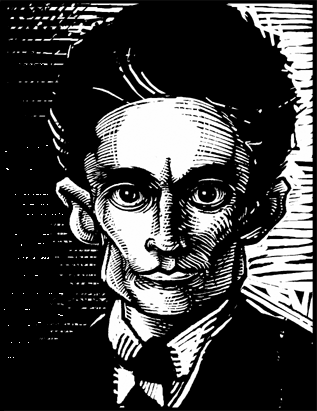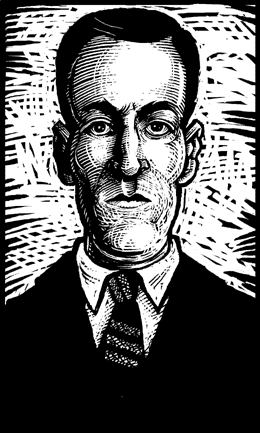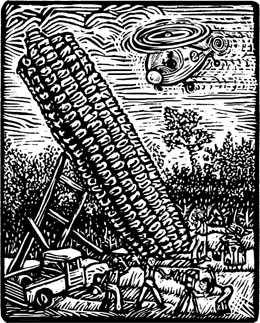
"I have great faith in fools, my friends call it self-confidence."- E.A.Poe
My process of working out these images was, in philosophy, the same as if I had been creating a traditional relief print, or even a scratchboard drawing. I drew the "negative space" to reveal the caricatures of these writers. This is also sometimes called the "white line" method.
The "white line method" requires an artist to think differently from the more usual approach of drawing with dark media, such as a pencil or ink, upon a light colored ground. In this process, you are drawing light instead of shadows.
Working digitally in this manner has advantages and disadvantages over traditional media. Advantages like the ability to zoom in and out as you work, having multiple undos, and being able to see a positive image as you work allow you to immediately see the final image - without the inking and pulling proofs of traditional printmaking. Drawing with a graphic's tablet and mouse is still an awkward experience; but, this awkwardness may be an asset in trying to reproduce this traditional style digitally.
The bold, lively, and spontaneous character of a traditional relief prints can be attributed to several factors:
• The tools are often too large for the required tasks (with exception to the fine detail possible in wood engraving or scratchboard work.)
•The physical difficulty of cutting into a hard surface with these tools.
• Because the artist's main attention is spent in carving the light colored lines and shapes, the positive image left is a byproduct of this action.
•The use of two values only
All of these reasons contribute to the high contrast, quirky, accidental appearance of the art; and my way of working digitally seems to mimic that look.

"Anyone who keeps the ability to see beauty never grows old."- F.Kafka
An example of a different approach to thinking and cutting an image from a relief block is found in traditional Japanese prints or some wood engraving illustrations. In these, great care has been taken by a craftsperson to preserve and reproduce the quality of an original, dark on light, drawing by an artist. The artist and the block carver could be the same person; but the act of "creation" was in the drawing, not in the carving of the blocks.
For me, the act of using knives, gouges in contrast to using a mouse and stylus are both valid in the creative process. I must admit that the digital world does lacks the tactile pleasures of a traditional method of working.
These images look like wood or linoleum cuts, even if they were created digitally. The thinking process involved in drawing with light on dark is still just the same thinking process with a few variations.
"Which is more important the method used to express an idea or the idea?"-Me
DIGITAL RELIEF
or
How to Think You are a German Expressionist Printmaker in a Digital World
These portraits were completed as an exercise to find a method of working digitally to create art and illustrations, which on the surface, visually resembled traditional relief printmaking.
••••••••••••••••••••••••••••••
"The most merciful thing in the world…is the inability of the human mind to correlate its contents."- H.P.Lovecraft
••••••••••••••••••••••••••••••
Here is an example of an image which has been scanned from an original linoleum block print and the helicopter is added digitally


